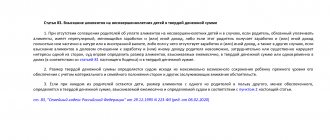Mortgage lending began to actively develop in Russia after the state adopted a maternity capital program aimed at increasing the birth rate in the country. In this regard, it is not surprising that young couples with children began to purchase their own housing on credit.
Of course, having a personal house or apartment is not a guarantee of strong marital relations and a guarantee of the absence of divorces, as a result of which some alimony providers are faced with double financial obligations, namely: the need to repay an existing mortgage and pay child support benefits. Sometimes these problems become an unbearable burden for the alimony payer. For this reason, persons obligated to pay alimony are often interested in the following questions:
- Is it allowed by law to reduce the amount of alimony due to a child if the alimony holder is simultaneously required to pay off the mortgage loan?
- Will it be considered a violation of the current legislation in the case when the payment of the mortgage goes towards alimony?
The mechanism for the occurrence of alimony obligations
There are 2 criteria by which government authorities establish the fact that an obligation to pay alimony may arise between 2 persons. These criteria are detailed in the table below.
| Family connection | Family connection |
It happens:
The family relationship is established in documents issued by the civil registry office, in particular, an adoption certificate and a birth certificate. | It exists from the moment of marriage until the moment of divorce. It is documented using a marriage certificate. However, in exceptional cases, alimony obligations may arise from a former spouse in relation to another former spouse. These include:
|
How alimony and mortgage are paid after divorce
All young families want to have their own apartment and live independently, but not everyone has this opportunity. Therefore, the topic of mortgage loans is gaining increasing popularity. But there are cases when spouses with young children and a mortgage get divorced, and then the question arises - alimony and mortgage after divorce, what to do in this situation.
Spouses faced with this situation are often interested in:
- Can the amount of alimony payments be reduced if the spouse repays the loan for the housing where the child currently lives?
- Can mortgage payments be used to offset alimony obligations?
- In cases where the mother receives child support and she also pays the mortgage, can this money be used to pay off obligations to the bank?
List of income taken into account in alimony obligations
- Salary, including bonuses, allowances, vacation pay and other remunerations, at the main place of work and at the place of part-time work.
- Royalties of authors and patent holders.
- Pensions and scholarships.
- Business income.
- Severance pay upon dismissal from employment.
- Income from stocks and bonds, as well as from the use of property, such as rental housing.
- Payments for compensation for damage caused by third parties to the health of the alimony.
- Amounts of financial assistance from the state and other persons.
- Compensation payments.
- Income received from the execution of civil contracts.
Methodology for calculating alimony
If the parties to the alimony obligation have entered into an alimony agreement among themselves, then they have the right to determine the amount of alimony to be paid, as well as the period of their payment at their own discretion. Below we will describe the principles for calculating the amount of alimony benefits, which are assigned by court decision.
For working people
In this case, workers will be understood as persons who are employed and officially registered with the employer, i.e. receiving “white” wages.
Entrepreneurs and investors are not included in this category because, due to the risky nature of their activities, they cannot have a stable income every month.
So, depending on the number of children the alimony payer has, he is obliged to pay maintenance in the form of:
- One fourth salary for 1 child.
- One third of the salary for 2 children.
- Half the salary for children of 3 or more.
For the unemployed
This category includes not only unemployed persons, but also:
- Persons working without registration, for example, freelancers, part-time workers.
- Persons who receive remuneration for their work in foreign currency or in kind (food products, industrial goods).
- Individuals with irregular or variable income, such as entrepreneurs or investors.
In this case, alimony can be considered by the judge for 2 reasons, described in detail in the table.
| Living wage | Written calculation of expenses for the maintenance of a minor |
The judge finds out what size of the child's subsistence minimum is established in the constituent entity of Russia in which the minor is officially registered. If the legislative bodies of a constituent entity of Russia for some reason have not determined this amount in their region, then the judge finds out what size of the children's subsistence minimum is established in Russia as a whole. For example, in Moscow it is 13,300 rubles, and in Russia as a whole it is 10,181 rubles. In most cases, the judge assigns an amount of alimony that fluctuates between 50% and 100% of the subsistence level. An increase in the amount of alimony benefits usually depends on the following factors:
| This basis is based on the principle applied in family law, which is that a child’s living conditions should not be allowed to deteriorate after the divorce of his parents. Consequently, parents, including the child support provider, must maintain the previously achieved level of well-being of the minor. How is this principle used in practice? Before going to court, the interested party collects written evidence of expenses made on the minor for a period of at least 2 months. These can be store receipts, receipts from online banks or online stores, various contracts. Next, the calculation is drawn up on a separate sheet of paper, or it is done on a computer. In it you need to calculate the average amount of spending for 1 month. For example, a mother found out that she spent 34,000 rubles to provide for her daughter. in 2 months. Therefore, the average amount of spending for 1 month is 34,000 rubles. / 2 months = 17,000 rub. This calculation with checks and receipts is attached to the claim as justification for the required amount of alimony support. In any case, the alimony recipient can count on reimbursement of at least half of the average monthly expenses for the child. In our example, 17,000 rubles. / 2 = 8,500 rub. If the alimony recipient is disabled or is forced to bear the entire burden of the mortgage loan, then alimony can amount to up to 100% of the amount indicated in the calculation. |
Is alimony reduced if there is a mortgage?
In order to weigh the pros and cons from a legislative point of view, it is necessary to consider each of the issues raised in more detail. In general, the situation with purchasing housing with a mortgage may be as follows:
- housing was purchased with a mortgage by one of the parents before marriage and the birth of a child - in such a situation, after the divorce of the spouses, the apartment remains with the owner, is not subject to division, and mortgage payments (despite the child’s registration in the housing) remain payable also for the owner of the residential premises - father or mother;
- the purchase of housing with a mortgage occurred during marriage, and after its dissolution, the real estate will be jointly acquired property, which, along with the mortgage debt, is divided equally between the spouses (Article 39 of the RF IC).
Despite the circumstances under which the mortgaged housing was purchased and who is the payer of the loan (one of the parents or both), these circumstances will not affect the assignment of alimony payments for child support, since the payment of alimony is considered a priority - parents are obliged to support their minor children regardless of the presence or absence of debt obligations.
That is, when collecting alimony in court:
- in shares (percentage of income) - for the maintenance of 1 child the court will assign an amount to be withheld in the amount of 1/4 of the payer’s earnings, two children - 1/3 of the share, three - 1/2 of the income (Article 81 of the RF IC) ;
- in a fixed sum of money - its size will primarily depend on the cost of living per child in the region of residence of the family and his needs (Article 83 of the RF IC).
In this case, the mortgage or other debt obligations of the payer of the funds will not be taken into account by the court if his income is sufficient. However, if the payer’s income for any good reason has changed in the direction of a significant decrease , he has the right to file a lawsuit in court for a change:
- the amount of alimony in a fixed amount of money from larger to smaller (Article 119 of the RF IC);
- the size of the shares of recovery from larger to smaller ones (clause 2 of Article 81 of the RF IC).
However, the mortgage burden itself cannot cause a reduction in alimony , since the payer’s debt obligations are secondary for the court, and child support is a priority.
Features of calculating the amount of alimony in the presence of a mortgage
Before moving on to the calculation rules, an important nuance should be noted: a mortgage is not an excuse for the alimony holder to accumulate alimony debts, and also cannot be a reason to refuse to fulfill alimony obligations. Child support refers to the unconditional obligation of parents who, according to the law, must support their own children. It doesn’t matter whether parents have loans or not.
Accordingly, the maximum that an alimony payer can do is, in some cases, to raise the issue of reducing alimony payments with the court.
Mortgage taken out before marriage
According to the general rule enshrined in the Family Code, premarital property after the dissolution of marital relations is considered to belong to the former spouse who was its owner before marriage. The same rule governs premarital loan obligations. This legislative norm is not an axiom, since spouses or future spouses have the right to regulate the fate of premarital property in a marriage contract at their own discretion.
Thus, we can highlight some legal nuances in the situation when the alimony holder pays for the mortgage after a divorce and when the alimony recipient pays for the mortgage.
| Mortgage on alimony | Mortgage on alimony recipient |
| It must be taken into account that the court first of all takes into account the interests of minors regarding the payment of alimony for their support, and secondly - debt obligations. It follows that if the alimony payer has a sufficient level of income, then he will not be able to achieve a reduction in alimony payments, citing a large mortgage debt. In other words, large amounts of debt without other valid reasons will not convince the judge to reduce the amount of monthly alimony. Let us explain what sufficient income is with an example. Let’s say a man living in Moscow officially earns 65,000 rubles. in 1 month. He has 1 child, for whose maintenance he pays a quarter of his salary in the form of alimony, i.e. RUB 16,250 In addition, he pays a monthly annuity mortgage payment of RUB 30,000. The cost of living for an adult in Moscow is 17,487 rubles. The concept of “sufficient income” means that after paying loans and alimony, a man should have an amount left to live on that is higher than the minimum subsistence level established for Moscow. So, 65,000 rubles. – 16,250 rub. – 30,000 rub. = 18,750 rub. Thus, we can see that the remaining income is RUB 18,750. more than the subsistence minimum of 17,487 rubles, and, therefore, the man in our example has sufficient income and cannot count on a reduction in alimony. | In this case, the obligated person is free from the mortgage and will thus pay alimony in full if there is sufficient income. |
Mortgage taken out during marriage
According to the general rule established in the Family Code, during a divorce, all property of the spouses will be divided in half, including the mortgage loan. The rule of sufficient income also applies in this situation. If the alimony holder has enough funds to pay both half of the mortgage and alimony, and at the same time he has more money left than the minimum subsistence level, he has no right to demand in court a reduction in the monthly alimony payment.
The apartment was taken out on a mortgage before the divorce
If the mortgaged apartment was purchased during marriage, then it is recognized as jointly acquired property. According to the law, spouses have equal rights to it, and debts are also paid equally. During division, the court will divide the payments in half, and the maintenance of a minor child will be determined separately, thus, the mother, with whom the children most often live, will receive alimony, but her obligations on the loan will not disappear.
Note! It doesn’t matter at all: who the creditor is, from whose funds contributions were paid during the marriage, whether maternity capital was used and who lives in the apartment. In general, mortgages and alimony can be used interchangeably, but you need to draw up an agreement and have it certified by a notary.
Can you pay off your mortgage with alimony?
If alimony support for a child was awarded by court, then repayment of a mortgage with alimony cannot be recognized as legal. In addition, the request for the transfer of alimony for the payment of a mortgage loan, filed by the alimony recipient in court, will be rejected.
However, there is a legal way out of this situation. To do this you need the following:
- A minor recipient of alimony must either have a share in the mortgaged housing (have an extract of ownership in his name) or be registered in it.
- Parents must go to a notary and conclude an agreement on alimony in his office, in which it must be indicated that alimony will be transferred to a mortgage bank account to pay off the financial obligations of one of the parents to the bank. The price for certification of the agreement will be approximately 5,000 - 10,000 rubles.
Can a mother pay her mortgage with child support?
Many fathers, being alimony payers, are very jealous of what alimony funds are ultimately spent on - i.e. they want the payments to have a specific purpose and be spent exclusively on the maintenance of the child, as the law interprets it. However, recipients of alimony - most often mothers of children - are not required by law to report to payers for their expenses.
Often, fathers, knowing about the mortgage obligations of the child’s mother, try to find out on their own whether the alimony payments they are transferring are being used to pay mortgage payments in order to stop this in the future or to hold the ex-wife accountable for “misdirected” spending of alimony funds.
In this situation, the person raising the child has nothing to worry about: if the child is dressed, shod, receives normal nutrition, development and education, then no questions should arise, because:
- in fact, it is impossible to accurately determine, much less prove, what specific money is spent on paying the mortgage (earned by the mother personally or received as alimony), since it is taken from the total income of the mother and child;
- alimony amounts should be spent on the maintenance, upbringing and development of the child, as well as maintaining his previous standard of living, maintaining his property - if the child is a co-owner of the mortgaged home (or is registered and lives in it), paying off mortgage payments will not be a contradiction to the law at all.
However, subparagraph 2 of Art. 60 of the RF IC still provides for the right of the alimony payer to request no more than 50 percent of the total amount of alimony to be transferred to the child’s personal account for the purpose of accumulating it - this is possible if it can be proven that it was misused.
It should be taken into account that even in this case, the mother, as the legal representative of the minor, has the right to withdraw these funds with the permission of the guardianship and trusteeship authority, indicating a good reason, without subsequent reporting to the payer about the expenditure of the money.
If the father accuses the mother of insufficient attention to the child (for example, the baby is poorly or unkemptly dressed, receives insufficient nutrition, is in poor health, etc.) with a sufficient amount of alimony payments, the conversation here should no longer be about where the alimony is spent, and about reconsidering the issue of the order of living with the parent (perhaps it is generally worth taking the minor away from the negligent parent and independently raising him).
The main ways to reduce the amount of alimony if you have a mortgage
A reduction in alimony payments can only be achieved by filing a claim with a magistrate. The alimony payer has the right to choose the judge to whom he will submit the application with other papers relevant to the case:
- At your own place of registration.
- At the place of registration of the alimony recipient.
In order to be able to refer to a mortgage as one of the grounds for reducing alimony, it is necessary to prove the existence of a connection between the mortgaged housing and the child. In other words, it is necessary for the child to be registered in this housing, or to own part of the property on the right of ownership.
Next, you need to stock up on evidence that the alimony payer’s earnings have decreased due to extenuating circumstances, and not through his fault. Such circumstances include:
- Assignment of disability group.
- A serious illness requiring expensive surgery or medications.
- Retirement.
- Loss of a job due to circumstances beyond the control of the alimony provider.
- A reduction in salary that occurred by order of the employer.
- Maintenance of new dependents, for example, a pregnant wife in a new family, elderly parents.
Unfortunately, what is described above is far from a guarantee that the court will agree with the alimony provider’s arguments and reduce alimony payments. Of course, if the parent living with the child has a large salary or significant income from business, then the child support payer has a high chance of achieving his goal in this situation. In other cases, everything depends on the judge and whether he considers the circumstances described by the plaintiff to be valid or not.
Lawyer's answers to private questions
I’m paying a mortgage, can the court release me from alimony if I don’t have enough money?
No. The presence of debts is not a basis for exemption from alimony obligations.
Is it possible to collect housing support for the mortgage paid by the mother who is left with the child?
Yes, if the minor has his own room in the mortgaged apartment and lives there.
Is alimony taken into account when applying for a mortgage?
Yes. When considering an application, the bank takes into account all the expenses of the potential borrower: other debt obligations, housing rent, alimony. If more than 50% of your earnings are spent on this, there is a high probability of being denied a housing loan.
Is it possible to demand alimony if my husband pays the mortgage, but I live in an apartment with a common child?
Yes. Alimony and mortgage obligations are not related to each other. Especially if a man voluntarily makes obligatory payments to the bank.
How is a military mortgage divided and alimony collected?
Housing purchased with a military mortgage most often remains with the military personnel and is not included in the general property. It can be recognized as common if it can be proven that during the marriage its value increased significantly due to joint efforts (Article 37 of the RF IC).
List of documents for filing a claim for alimony reduction
You can use this sample to write your own statement of claim. Additionally, other documents may be required in court proceedings, which it is advisable to collect in advance and make 3 copies based on their originals:
- Passport data from the first 2 pages of the passport (photo + place of registration).
- Birth certificate of the minor recipient of alimony.
- A writ of execution for a court decision on alimony or an agreement on alimony.
- Loan agreement with the bank and mortgage agreement.
- Checks for payment of the monthly mortgage payment (at least 2 months).
- Pensioner's certificate (upon retirement) + certificate from the Pension Fund about the amount of the pension.
- Medical certificate of disability (if a disability group is provided).
- A medical certificate confirming inpatient treatment in a hospital, if the reason for the decrease in income is a serious illness.
- A dismissal order or an order to reduce wages if the decrease in income is due to problems at work.
- Documents confirming that the plaintiff supports other dependents (adoption certificate; court decision to claim alimony for the needs of elderly parents).
Alimony: new in legislation
Speaking in defense of the rights of debt collectors whose alimony defaulters have been wanted for more than 1 year, in October 2021, the Government of the Russian Federation introduced bill No. 277183-7 “On amendments to Art. 278 of the Civil Procedure Code of the Russian Federation and the Federal Law “On Enforcement Proceedings”. Later, on March 7, 2021, the law was approved by the President of the Russian Federation V.
Important
Putin. The law implies the assignment of a survivor's pension instead of alimony to those minor children whose parent, obligated to pay alimony by court decision, has been on an unsuccessful enforcement search for more than 1 year
Thus, the state itself, represented by the Pension Fund of the Russian Federation, becomes the actual payer of alimony.
State duty amount
Judicial practice regarding the state fee charged for the consideration of cases of reducing alimony has not yet been established, so the courts can require payment of the fee based on 2 different principles:
- Some judges believe that such cases relate to property claims, the subject of which cannot be assessed, so they require a fee of 300 rubles to be paid.
- Other judges believe that such cases relate to property claims in which the exact value of the claims can be determined. The rules described in the table below will help you calculate the duty.
| Price of the stated requirements, in rubles. | Calculation formula |
| More than 1 million | Half a percent of the amount is paid, which is calculated according to the formula (Claim price - 1 & 000,000 rubles) + 13,200 rubles. If the amount received is more than 60,000 rubles, then 60,000 rubles are paid. |
| 200 001 – 1 000 000 | One percent of the amount is paid, which is calculated according to the formula (Claim price - 200,000 rubles) + 5,200 rubles. |
| 100 001 – 200 000 | Two percent of the amount is paid, which is calculated according to the formula (Claim price - 100,000 rubles) + 3,200 rubles. |
| 20 001 – 100 000 | Three percent of the amount is paid, which is calculated according to the formula (Claim price - 20,000 rubles) + 800 rubles. |
| Less than 20,000 | Four percent of the amount of the stated claims is paid. If the amount received is less than 400 rubles, then 400 rubles are paid. |
The fee is calculated based on the amount that the plaintiff will save in 1 year if he pays alimony at a reduced amount. Let us illustrate this with an example.
The ex-husband pays 10,000 rubles every month for child support. and plans to reduce this amount to 7,000 rubles. Thus, every month he will save 3,000 rubles, and in a year he will save 3 & 000 x 12 months. = 36,000 rub. This amount will be the cost of the claim.
Next we calculate the duty. The formula is as follows (36,000 rubles – 20,000 rubles) x 3% = 480 rubles, to which you need to add 800 rubles. As a result, we get the final amount of 1,280 rubles.
Now we need to answer the question: “How should the fee be paid if it is not known on what basis the judge will calculate it?” To do this, use the algorithm given below:
- If you have the opportunity to consult with a judge, you should ask him about the fee.
- If it is impossible to consult, then first pay a fee of 300 rubles. as for a claim, the subject of which cannot be assessed.
- If the judge returns the application and demands that the fee be recalculated according to the rules of property claims with the exact price of the claims, use the formulas given earlier in the table and the calculation example described 2 paragraphs above. After this, pay the remaining amount through the bank.
New marriage: how to save what you have acquired
I'm in my early 40s and am dating a man several years older. I earn several times more than him. We are not married yet, but we are thinking about registering our marriage. We are not planning to have children together; we each have grown children. How can I insure myself so that if something happens I don’t lose what I’ve acquired on my own? This is not the first marriage. Everyone has their own apartment, car, dacha.
A good solution in your situation could be a prenuptial agreement, which can be concluded both before marriage and while already married. The marriage contract is drawn up in writing and notarized. In this agreement, you can stipulate all property and material issues in the way you mutually want.
If you do not enter into a prenuptial agreement, then all property that you acquire during the period of cohabitation will be your joint property and in the event of a divorce is subject to division between both spouses. In this case, it does not matter which of the spouses acquired the property, which of them it was registered in, or which of the spouses contributed funds.
The property that belongs to you now, that is, before marriage, and the property that you can receive while married, but as a gift or by inheritance, as well as personal items (clothes, shoes) will be your personal property and is not subject to division in case of divorce.
I would like to reflect one more very important point: if your spouse, during the period of cohabitation with you, makes investments that significantly increase the value of your personal property - for example, makes major repairs in your apartment or makes a major extension to your private house - then in the event After a divorce, he will be able to go to court to have your property recognized as joint property. But this is only possible if you do not have a marriage contract in which you would stipulate such points.
Arbitrage practice
The case was heard at court district No. 1 of the Duvan district of the Republic of Bashkortostan in July 2011.
The ex-husband demanded in court to reduce the amount of alimony he paid in favor of his son from his first marriage to one-sixth of his earnings and to completely free him from maintaining his ex-wife. The plaintiff substantiated his claims with the following facts:
- He entered into a new marital relationship, in which the plaintiff had a child. Due to the fact that the wife is on maternity leave, the plaintiff is forced to support her and the child on a monthly salary of 14,500 rubles.
- In addition, the plaintiff is obliged to pay a monthly mortgage of 6,620 rubles, a consumer loan in the amount of 1,400 rubles. and utilities 2,000 rubles.
- Based on the above circumstances, the plaintiff believes that a child from a second marriage is less wealthy than a child from a first marriage, because the ex-wife has a husband who provides for her and the child.
- He also stated that he was not obliged to support his ex-wife due to the fact that they were in a marital relationship for a short period of time, namely less than 1 year.
The defendant made objections, the meaning of which was as follows:
- The plaintiff is wrong in asserting that the defendant’s financial security is better than his. The plaintiff’s income structure consists not only of wages, but also of unofficial earnings. In addition, the plaintiff’s second wife owns a car and additionally receives child benefits.
- Satisfaction of the claim will lead to the fact that the plaintiff’s children from different marriages will not be provided for equally.
- The rule on the short duration of marriage does not apply to able-bodied persons, which includes the defendant, who worked as a lawyer before her maternity leave.
- The defendant's second husband, by law, does not have to provide for her child, because the second husband did not adopt him.
- She has no income due to maternity leave, and she does not receive child support, so alimony is the only source of funds.
Following the trial of the case, the judge decided to refuse the plaintiff for the following reasons:
- It is impossible to reduce the amount of monthly alimony collected for a child from a first marriage, because in this case he will be in a less secure position than a child from a second marriage.
- The plaintiff has a higher income and owns more expensive property than the defendant, and is thus in a better financial position. This is confirmed by information from the tax office, extracts from Rosreestr (availability of a 2-room apartment), certificates from the traffic police (availability of a foreign car for the plaintiff and Lada Priora for his second wife).
- The plaintiff's second wife, according to a certificate from her place of work, actually receives child benefits.
- The mortgage loan is paid not only by the petitioner, but also by his second spouse, with whom the petitioner shares both a common budget and common expenses.
- The defendant does not receive any child benefits and is on maternity leave, which is confirmed by a certificate from her employer.
- The rules on the short duration of a marriage or on the entry of an alimony recipient into a new marital relationship apply only to the category of disabled citizens, to which the defendant does not belong.
What to do with your mortgage?
The first thing you need to know is the fact that all property that a married couple acquired during marriage is divided between the former spouses in equal shares.
Often, during a divorce, husbands make claims that they were the ones who paid the mortgage while the woman was on maternity leave. In this case, the property is still divided in half. If the mother was on maternity leave and later cared for a child or children, during a divorce she has the same rights to a mortgage as the father, even if during this period only he paid the mortgage.
Regulatory framework
| Regulatory acts | Articles of laws |
| Family code | Article 82 contains a reference to the list of income from which alimony is withheld. Article 116 establishes a ban on offsetting alimony with other requirements. Article 119 sets out a list of circumstances that allow the alimony payer to demand a reduction in alimony through the court. |
| Tax Code (Part 2) | Section 333.19 describes court fees. Article 333.24 – notary fees. |
| Decree of the Russian Government of July 18, 1996 | This list describes all categories of income from which the collection or withholding of alimony payments in favor of the alimony recipient is allowed. |
Mortgage as parents' participation in additional expenses for the child
The legislation provides for the right of parents who raise their children to assign not only alimony in favor of the child, but also participation in additional expenses that do not cover alimony payments. But there must be exceptional life circumstances.
Is it possible to classify a mortgage as an exceptional circumstance and collect additional money from the parent?
To satisfy the claim of a parent who files such a claim, you must:
- calculate the monthly expenses for the child, attach receipts and receipts;
- compare all costs incurred with your monthly income and alimony;
- demand from the court half of the monthly mortgage obligation if the child lives in the apartment, is registered in it or is a co-owner.
Let's give an example: Svetlana receives alimony for her son every month. Amount – ¼ of the ex-husband’s official salary: 5,000 rubles. For a mortgage on a home that is shared in ownership with my son, you need to pay 20,000 rubles a month. Svetlana decided to go to court to recover additional expenses from her father to pay the mortgage loan for her son’s share (the family has no other living space).
Calculation: (20000/2)/2=10000/2=5000 rubles:
- 20,000 – regular mortgage payment;
- 10,000 – payment of mortgage debt for daughter’s share (½);
- 5,000 – the parents’ share in the maintenance of the child’s property.
The writ of execution will be the final result of a positive court decision . The document is submitted to the bailiff service at the defendant’s place of residence or place of work, so that the employer withholds a certain percentage of the salary every month.









